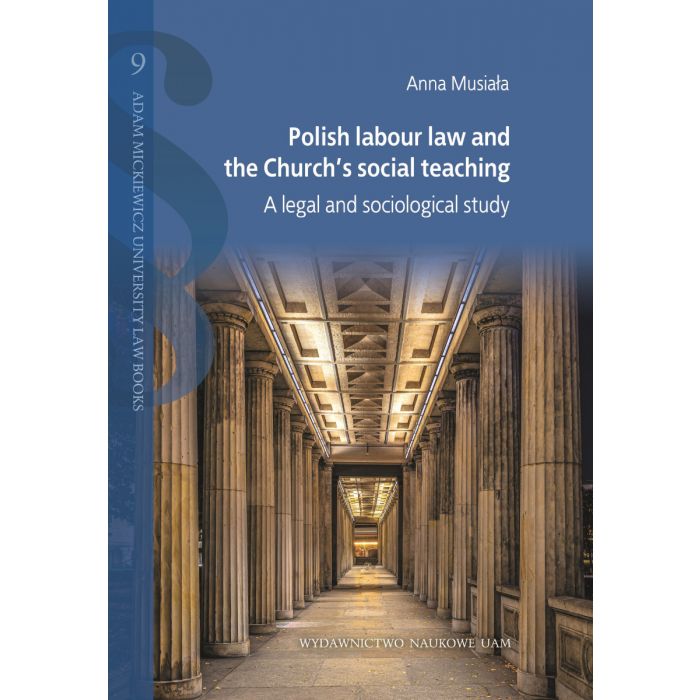Polish labour law and the Church’s social teaching. A legal and sociological study
- In Stock: in stock
- ISBN: 978-83-232-3560-6
- Category: Law, Adam Mickiewicz University Law Books
- Year of publication: 2019
Nagroda im. Anieli hrabiny Potulickiej za wybitne osiągnięcia naukowe wpisujące się w idee chrześcijańskiego humanizmu
Socio-political doctrines are of substantial significance in the law-making process. Referring to them brings order to the process of decoding the axiology of law. In the Polish cultural sphere, which is part of Western culture, it is the social doctrine of the Catholic Church that is fundamentally important; it is essentially the co-creator of the “system of European values.” But this doctrine is particularly interesting from the point of view of labour law, because in an extremely comprehensive and entirely clear way it indicates a defined and detailed model of how employment relations develop. Therefore, bearing in mind that the social doctrine of the Church in the Polish cultural sphere has considerable importance and its contribution to the development of labour law is indisputable, we must ask how it is reflected in Polish labour law. It is a question of examining the extent to which ideas stemming from Church doctrine are present in the current form of Polish labour law. Is it at all ”attractive” for the Polish employer? One might also inquire as to its potential “attractiveness” in the future, especially in the context of attempts made at codification. The research hypothesis comes down to showing that with regard to the significance of the Church’s social doctrine in the Polish cultural context the conceptual inspirations stemming from this doctrine can be sought out in Polish law-making. This seems particularly justified in terms of labour law, owing to the fact that this doctrine presents its vision for employment relations in a very complex way.
Introduction
Chapter I. Preliminary issues
1. Explanation and justification of the subject
2. State of the research on the topic and characteristics of the main approaches in case law and of the doctrine
3. Assumptions underlying the concept and the research hypothesis; the main subject matter
4. Structure of the work
Chapter II. Catholic social teaching and human labour
1. Preliminary issues
2. The concept of Catholic social teaching (CST)
3. Fundamental principles of Catholic social teaching in relation to human labour
3.1. The personalistic dimension of human labour
3.2. Blurring the paradox of human labour and capital: employee shareholding
3.3. A company and the workplace: a “community of fate” and a “community of life”
3.4. The workplace in relation to the organisation of the state
3.5. Fair pay: “a share in the distribution of wealth”
3.6. Collaboration and co-responsibility of trades unions: employee participation
3.7. The strike as a last resort
4. Conclusions
Chapter III. The Contemporary system of Polish labour law and the principles of the Church’s social teaching in the field of human work
1. Preliminary issues
2. Foundations of the work regime in the light of the Constitution of 1997
2.1 Introductory remarks
2.2. The social market economy principle
2.3. The labour protection principle
2.4. The social justice principle
2.5. Conclusions
3. A worker and a man of work in the social teaching of the Church
3.1. Introductory remarks
3.2. Freedom to choose the form of occupational activity: a sole trader’s economic activity or employment
3.3. Is there really no freedom of “choice” in the employment relationship?
3.4. A worker? Or maybe really a man of work? – determination of the subject of Polish labour law from the viewpoint of the Church’s social teaching
3.5. Is there such a thing as “worker’s dignity”?
3.6. Conclusions
4. Is it really an “employee-employer relationship?”
4.1. Introductory remarks
4.2. Characteristics of a work relationship as a legal relationship: a mutual obligation?
4.3. The “social” dimension of the work relationship
4.4. The common good? Solidarity? Subsidiarity? – Justification of the “social” dimension of the work relationship
4.5. The workplace – a consequence of the ”social” dimension of the work relationship?
4.6. The employee’s duty to work ”for the employer?”
4.7. Work ethos
4.8. Conclusions
5. Rights of a man of work: human rights or labour rights?
5.1. Introductory remarks
5.2. Man’s dignity as a source of the rights of a man of work
5.3. The right to work as a fundamental right of a man of work?
5.4. The right to work under the Polish legal system
5.5. The human rights of a man of work and labour rights: the extension of labour law
5.6. Conclusions
6. A man of work remunerated “fairly”
6.1. Introductory remarks
6.2. The “essence” of the concept of the remuneration for work in the Polish legal system
6.3. The “fairness” of the remuneration of work
6.4. Conclusions
7. Man in collective labour law
7.1. Introductory remarks
7.2. The right of association of working people
7.3. Together or in opposition? Solidarity in the activities of social partners
7.4. Conclusions
Final remarks
Bibliography
Summary Polish labour law and the Church’s social teachings (a legal and sociological study)
| Detailed information | |
|---|---|
| Introduction |
Download file

|
| Contents |
Download file

|
| Summary |
Download file

|
|
|
|
| Publication Version | printed |
| Format | 17,0 x 24,0 |
| Type of publication | Monografia |
| Edition | I |
| Series | Adam Mickiewicz University Law Books No. 9 |
| ISBN | 978-83-232-3560-6 |
| Number of pages | 228 |
| Number of publishing sheets | 16,00 |
| Type of binding | hardcover |





